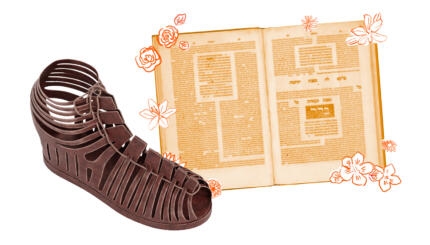Yevamot 77 continues a discussion begun on the previous daf about whether marriage is forbidden between Israelites and Moabite or Ammonite women as it is with Moabite or Ammonite men. To answer that question, the Gemara imagines a conversation between Doeg the Edomite, King Saul’s chief herder (and spy), and Abner, Saul’s general. The text imagines Doeg seeking to prove that King David is an unacceptable successor to Saul because he is descended from Ruth, a Moabite woman.
The scriptural prooftexts brought by the Gemara to demonstrate that these foreign women are indeed permitted are fascinating and shed light on another subject entirely: modesty, or tzniut.
Beginning at the bottom of 76b, we read:
Doeg said: The reason for the prohibition recorded in this verse with regard to Ammonites is explicit: “Because they did not meet you with bread and with water on the way when you came forth out of Egypt” (Deuteronomy 23:5).
With your help, My Jewish Learning can provide endless opportunities for learning, connection and discovery.
Abner responds: Since it is the way of a man to go forth to meet guests, but it is not the way of a woman.
Doeg countered: Still, the men should have gone forth to meet the men, and the women to meet the women.
The verse in Deuteronomy that bars Israelites from marrying Ammonites and Moabites explains the reason why: Because those nations did not offer the newly freed Israelites bread and water after the Exodus from Egypt. Doeg argues that this standard should apply to both men and women, but Abner counters that it is only men who are expected to meet guests, and therefore the prohibition should not apply to Ammonite and Moabite women.
The Gemara is setting us up to understand that there is a difference between how men and women are expected to greet guests, and it offers two additional passages to prove that this is so.
Here (in Babylonia) they explained the matter based on the verse: “The king’s daughter is honored within” (Psalms 45:14). In the West (in Israel) they say, and some say it was Rabbi Yitzhak who said: The verse states: “And they said to him: Where is Sarah your wife? And he said: Behold, in the tent” (Genesis 18:9).
The rabbis use two prooftexts — a general one from Psalms and the specific example of the matriarch Sarah staying behind in the tent while her husband went out to greet guests — to demonstrate that we can’t learn anything from the fact that the Ammonite and Moabite women refrained from going out to greet the Israelites. Women, they say, belong at home. They shouldn’t be going out at all.
Indeed, some Jews today understand Psalms 45:14 in precisely these terms. In certain religious Jewish communities today, women’s faces are erased from billboards, magazines and brochures in the name of modesty. But this is not the only way to understand the value of tzniut.
As Rabbi Marc Angel (quoting the late Rabbi Dr. Norman Lamm) writes: “One who lacks the sense of inner dignity and worth will expose himself [or herself], as if to say, ‘Look at me. Am I not beautiful? Am I not smart? Do you not like me?’ The lack of inner dignity leads to exhibitionism, the opposite of modesty, whereas a sense of inner dignity will normally result in the practice of modesty.”
Rather than reading “the honor of the princess is inside” as a call to keep women invisible, what if we read it as championing humility in general? In this reading, modesty ensures the dignity of every member of the community while ensuring that women are not confined to the domestic realm. After all, if Ruth had stayed home, King David would never have been born and would have never written the Psalm that we, and the rabbis, are discussing today.
Read all of Yevamot 77 on Sefaria.
This piece originally appeared in a My Jewish Learning Daf Yomi email newsletter sent on May 23rd, 2022. If you are interested in receiving the newsletter, sign up here.



